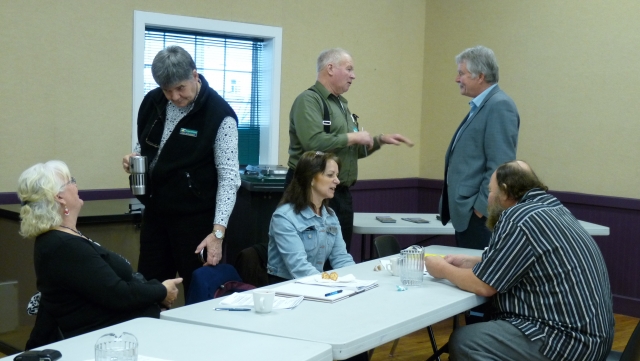Christina Lake in good health say experts
Core operations for the protection of the Christina Lake watershed are threatened by a loss of funding in the next year. At their annual watershed management plan and implementation strategy review, Stewardship Co-ordinator Brenda LaCroix explained that the loss of access to gaming funding that they have received for the past three years will have a large impact in their operations. “The number one issue under core initiatives is that we need to have a base,” said LaCroix. “So we need to keep the stewardship centre open so we can house all our documents and it’s a nucleus for all our operations and field work. We’ve secured funding until November 2011. but with B.C. Gaming cuts to the environment sector its created quite a bit of uncertainty with NGO’s in the environmental sector so we’re going to have to work really hard this coming year to get more funds for the centre.” The Christina Lake Stewardship Society has been a significant driver behind many of the projects and activities around the lake to protect habitat, provide education, information and resources for residents and visitors, and partnering with many outside agencies on critical projects. Despite the uncertainties, the work of the society has been steady. Speakers throughout the meeting highlighted the successful partnerships that the society has been involved with to manage their watershed. MLA John Slater was on hand to talk about the provincial revision of the Water Act that he is heading up as parliamentary secretary for water stewardship. Surprisingly, despite the low levels of river flows in the Boundary, the droughts have been much more prominent in Northern B.C. “We’re concerned that all levels of government are insufficiently resourced to enforce the laws that we already have in place and stress that sufficient support is crucial to the implementation of the new water act,” said Slater. “Not everyone in B.C. agrees on how to best manage our water. We need to make sure we have an area based approach to take care of our watersheds.” As part of a brief update on the Kettle River watershed study project, Area C Director Grace McGregor addressed the Cascade power project. Although the water licence is for a period of 40 years, the environmental assessment has to be re-done in 2011, and she has hopes that through that process the community can pressure government to defeat the project. The annual water quality monitoring program, overseen by Mike Sokal, environmental impact biologist for the Ministry of Environment, addressed the data collection over 2010. Sokal congratulated the volunteers of the society who do monitoring throughout the summer giving a picture of the lake’s health. Sokal commented that the overall lake water quality is very good. Always a hot topic, the Eurasian milfoil removal program, presented by Alan Stanley of the Regional District of Kootenay Boundary (RDKB), showed an impressive number of plants removed. In 2003, the hand-pulling program done by divers, harvested 100,000 plants. This year they took out 683,000 of the offending weeds. Stanley said that the continued success of the program is really linked to funding. “What was recognized in (a report) in 2006 which is continuing to make itself abundantly known is that we’re collecting more plants every year,” said Stanley. “If those trends continue, you’re going to hit the wall. Dave and his crew pulled even more plants this year, but we still had complaints. The choice must be made to add capacity or reduce efforts at some sites.” McGregor and Stanley will be meeting with B.C. Parks to request additional funding for the project on Dec. 13. If additional funding is not found, they will be asking for public input to make decisions about where control efforts will be focused. Along with the harvesting program they are continuing to explore options for bio-control with milfoil weevils. Lisa Tedesco, ecosystem biologist with the Ministry of Natural Resource Operations gave a presentation on fisheries and ecosystem management in the Boundary region including river flow monitoring, fish habitat projects, and the development of a stream flow protection plan for the Kettle and Granby rivers. Overviews were done for the proposed area C riparian protection regulations by Mark Andison with the RDKB, B.C. Timber Sales operations in 2010 by George Edney, and noxious and invasive plants were identified by Jen Haynes and Jody Henshaw of the Boundary Weed Management Committee. While Conservation Officer Dave Webster did spend a fair bit of time on bear problems near the lake this year, he continues to focus on waterfront development violations of the federal Fisheries Act and the provincial Water Act. Despite the abundance of information, some residents at the lake continue to impact the foreshore and alter natural habitat. The annual review report will be available at the stewardship office or online soon. Actual presentations from the speakers are below – click on a file to read more. Brenda LaCroix’s presentation was too large for our system – check their website for more info. www.lakesteward.ca for more information






















